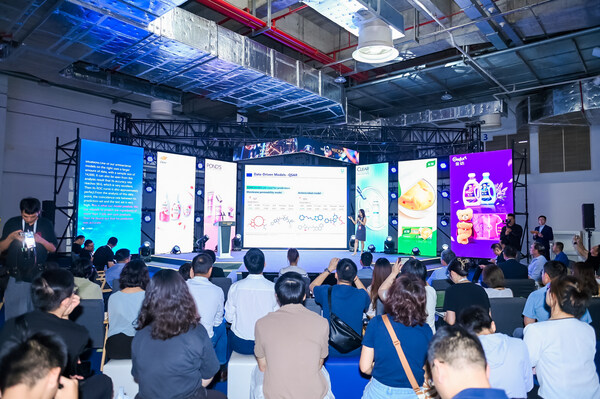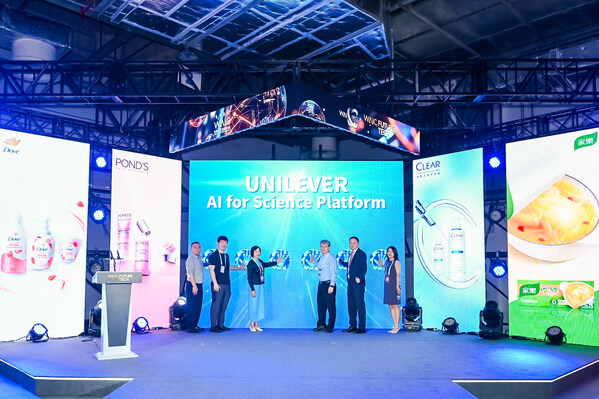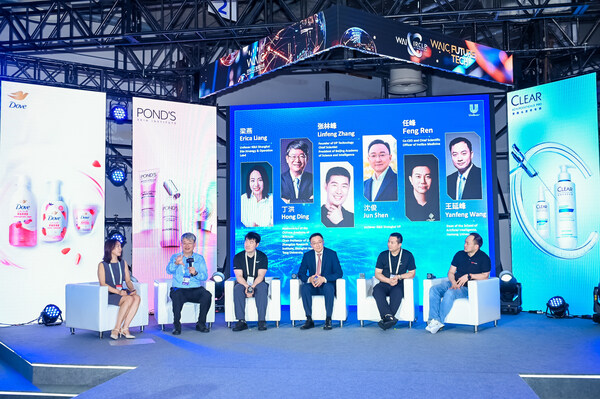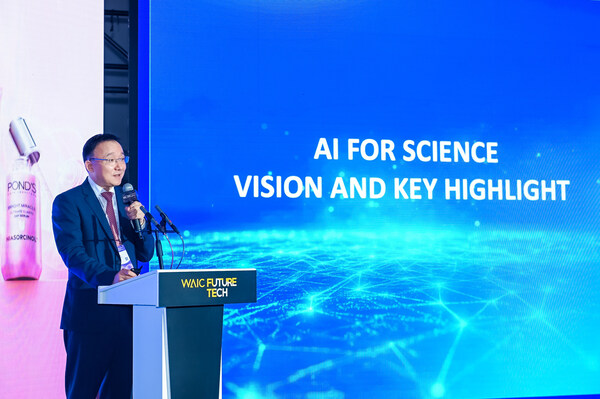Unilever launches "AI for Science" innovation platform, ushering in a new era of AI-driven scientific research
SHANGHAI, July 27, 2025 /PRNewswire/ -- During the 2025 World Artificial Intelligence Conference (WAIC), Unilever, a leading global consumer goods company, made its debut as a corporate exhibitor for the first time and participated in a number of AI-themed forums and industry dialogues, demonstrating its strategic thinking and practical layout in the field of artificial intelligence.
During the conference, Unilever also officially launched the "AI for Science" innovation platform developed by its Chinese R&D team. The platform uses AI as an engine to deeply reconstruct the underlying logic of scientific research and product development, aiming to promote more efficient product innovation and continuously bring consumers a better consumer experience.

Unilever China participated in 2025 WAIC to showcase the company's strategic thinking and practical layout in the field of AI
Reshaping the road to product innovation with the new R&D paradigm of "AI for Science"
As Unilever's latest project in AI research and development, the "AI for Science" innovation platform is not only an important achievement of the company's scientific research, but also a key step in driving sustainable growth with science and technology and accurately responding to consumers' ever-changing and diversified needs. The platform has currently explored and built six major AI models, including the development of antiseptic enhancement ingredients, sensitive skin prediction, active substance discovery, target exploration, fabric softening effect prediction, and oral irritation level prediction, covering the entire research process from raw material screening to efficacy verification.

Unilever China launched the "AI for Science" innovation platform at the 2025 WAIC (from left to right: DP Technology CEO Sun Weijie, DP Technology co-founder and CTO Zhang Linfeng, China Flavor & Fragrance Cosmetics Industry Association Chairman Yan Jiangying, Chinese Academy of Sciences Academician Ding Hong, Unilever China R&D Center Vice President Shen Jun, Unilever China R&D Strategy and Operations Director Liang Yan)
These models not only improve R&D efficiency, but also fundamentally change the R&D methods. For example, the AI for Preservative R&D model accurately selects preservative ingredients with both high antibacterial ability and excellent skin feel by building a preservative efficacy prediction system and a multi-target antibacterial screening mechanism, thus achieving a transition from "trial and error based on experience" to "data-driven". With the help of this model, Unilever successfully compressed the molecular screening and verification process, which originally took several years, into a few months, significantly accelerating the pace of new ingredient development and bringing higher safety, stability and better user experience to daily chemical products during their life cycle.
The clothing softening effect prediction model was launched to create better clothing care products. The model is based on Unilever's decades of experience in clothing cleaning and care. Through AI in-depth learning, it analyzes the microscopic interactions between different functional ingredients and fabrics of different materials, establishes an algorithm model, explores the intelligent and large-scale screening of the three-dimensional matching of "ingredients-materials-performance", and quickly finds functional ingredients that can provide high-quality "care" for different fabric materials, creating efficient and versatile clothing care products. Transforming "trial and error" research and development into data-driven "predictive" innovation has not only greatly accelerated the speed of product innovation, but also achieved the "one bottle for a variety of different fabrics" clothing care experience with the power of AI.
Focus on the local AI ecosystem and drive the consumer industry towards intelligent upgrades
The successful implementation of Unilever's "AI for Science" innovation platform is due to the company's long-term AI research capability system. As an important part of Unilever's global research data platform, the platform will provide important R&D innovation ideas and means for Unilever China and global R&D. The interconnection and collaborative innovation between Unilever China and the headquarters have promoted the "acceleration" of AI applications in corporate R&D.
In addition to the company's own strong scientific research capabilities and AI data reserves, Unilever's current phased results in intelligent R&D also rely on China's leading scientific and technological innovation environment and open cooperation atmosphere. Ten years ago, Unilever began to cooperate with scientific research institutions such as the Chinese Academy of Sciences to continuously promote scientific research based on big data. In 2020, Unilever officially established the AI Hub, marking the starting point of its systematic layout of AI strategy in the field of R&D. Since then, a number of digital tools have been launched to promote efficient and high-quality R&D. For example, iPREDICT, which uses big data to accurately understand market trends, improves the quality and efficiency of sustainable product packaging design through the PCCH intelligent packaging co-creation link, and launches the RoboLab smart laboratory to speed up formula research. Unilever explores AI applications in the entire R&D chain, which will not only help improve the quality and speed of its own product R&D, but will also inject new momentum into the intelligent development of the consumer goods industry, bringing consumers a better quality and more demand-oriented experience.
In recent years, Unilever China has continued to expand its AI R&D ecosystem "circle of friends", working with innovative partners including the world's leading AI technology companies Deepin Technology and Insilicon Valley, and injecting strong momentum into Unilever's research system by continuously developing cutting-edge AI research projects. The "AI for Science" innovation platform was jointly built by Unilever China and Deepin Technology.

Unilever and industry partners discuss AI-driven consumer industry upgrades (from left to right: Liang Yan, head of Unilever China R&D strategy and operations, Ding Hong, academician of the Chinese Academy of Sciences, Zhang Linfeng, co-founder and CTO of DP Technology, Shen Jun, vice president of Unilever China R&D Center, Ren Feng, co-founder and CEO of Insilico Medicine, and Wang Yanfeng, dean of the Artificial Intelligence Research Institute of Shanghai Jiao Tong University)
"The launch of the 'AI for Science' platform is an important exploration of how we can deeply integrate artificial intelligence into scientific research practice, which can significantly improve the accuracy and efficiency of research and development," said Shen Jun, vice president of Unilever China Research Center. "With the power of AI, we can find technical solutions more accurately and develop more targeted products to meet consumer needs. At the same time, AI also greatly improves research and development efficiency, allowing more innovative results to be implemented faster and respond to market changes in a timely manner."

Shen Jun, Vice President of Unilever China R&D Center, shared the vision of the "AI for Science" innovation platform project
In Unilever's latest corporate strategy "Growth Action Plan 2030", artificial intelligence has been officially established as one of the key engines for the company's transformation and upgrading. For Unilever, artificial intelligence is not only a technical issue, but also a manifestation of strategic thinking - it is deeply embedded in various dimensions such as performance growth, operational efficiency and corporate resilience, and has become an important pillar to drive the sustainable development of future businesses. In the future, Unilever will continue to deepen its strategic layout of artificial intelligence, work with ecological partners to create a new era of intelligence, and make the daily lives of consumers better due to technological empowerment.
